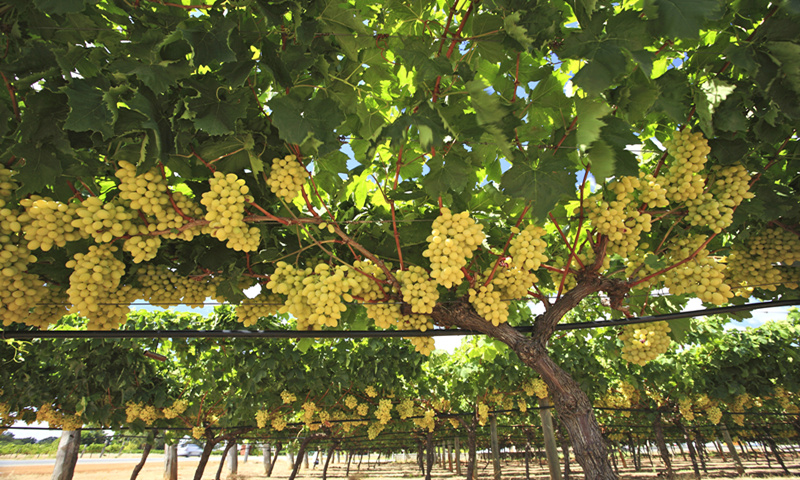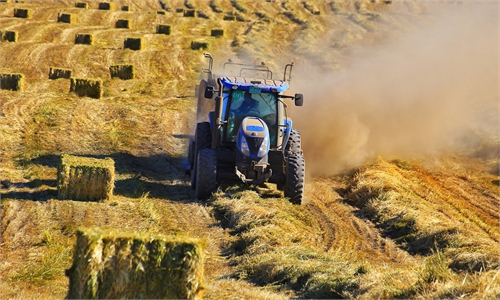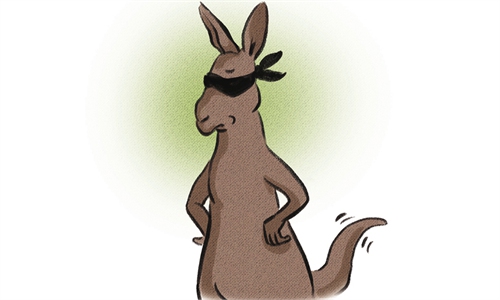Australian fruits face delays at Chinese ports due to strict anti-virus inspections: sources
Chinese firms seek other sources for fruits amid tense ties

Grapes in a vineyard in Australia File photo: VCG
Chinese fruit industry insiders and sources confirmed on Sunday that Australian grapes and other fruits are facing inspections and delays at some ports, as China takes strict measures to inspect imported fruits to stem the spread of the COVID-19 as the global pandemic intensifies again.
It remains unclear when a backlog of Australian grapes waiting to be inspected will be cleared, but Chinese importers are already moving to reduce the proportion of Australian fruit due to low profits and worsened bilateral ties, while increasing imports from other sources such as New Zealand and Thailand.
Reports of such delays came as bilateral relations further plunged after Canberra used an anti-China law to tear up agreements signed between the state of Victoria and China regarding the Belt and Road Initiative. China has vowed to take forceful countermeasures, but has not announced any so far.
Several industry insiders familiar with the matter told the Global Times on Sunday that clearance delays for Australian grapes are mainly due to the ongoing epidemic in Australia and the need to conduct nucleic acid tests on imported fruit to protect public health. This is a normal practice for epidemic prevention, they said.
"There are indeed many containers of Australian grapes waiting for inspection at ports … authorities are working extra hours to clear the backlog," a source familiar with the matter told the Global Times on Sunday, adding that it remains unclear when the backlog can be cleared. Other fruit shipments from Australia are also under inspection, the source said.
A manager at Shenzhen Huitong, a logistics company based in Shenzhen, South China's Guangdong Province, said that Australian grapes are being stockpiled for nucleic acid tests.
"The process can take as long as seven days," said the manager. But the inspection process also applies to many other goods from epidemic-hit countries, the manager added.
Some foreign media reports claimed the customs delays "may be the latest casualty" of bad bilateral relations. That also reflected Australian exporters' rising nervousness as their government is relentlessly pulling bilateral relations into an abyss.
Reuters reported on Friday that Australian table grapes have been experiencing lengthy delays at Chinese ports for the last three weeks. Citing Jeff Scott, CEO at the Australian Table Grape Association, Reuters said that about 400 or 500 containers that are taking between five and 10 days longer than normal to be cleared.
"In the aftermath China moved to limit imports of Canberra's barley, beef, cotton and seafood - and in what may be the latest casualty, Australian grape growers said they are experiencing customs delays," the report said.
In the 2019/20 season, more than 220,000 tons of Australian table grapes were grown, with 70 percent exported. China was the largest market for Australian grapes, taking about 41.3 percent of the total, followed by Indonesia and Japan at 8.8 and 7.5 percent, respectively, data from the Australian Table Grape Association showed.
However, some fruit importers told the Global Times that they have already reduced imports of Australian fruits, including grapes, since the beginning of this year for multiple reasons "beyond their control."
A manager surnamed Li with Yeguo trade company in Guangzhou told the Global Times on Sunday that the market is "unfavorable" for Australian grapes, whose prices are too low to be profitable, and there is also an oversupply.
"Previously, the price was around 20-22 yuan ($3.08-$3.39) per kilogram for grapes from Australia and now it's nearly 11.1 yuan," she said.
Another trader surnamed Chen also based in Guangzhou, who has been in the fruit import business for years, told the Global Times on Sunday that he is reducing the share of Australian fruits these days because of port delays.
He is expanding fruit imports from other countries, in particular New Zealand and Thailand. "Fruits from those countries are gaining popularity these days as more quality seasonal fruits begin the harvest," said Chen.
In January and February, China imported 1,238 tons of fresh grapes from Australia, down 38.8 percent year-on-year, with a total value of $5.29 million, down 30.1 percent year-on-year, data the China Fruit Marketing Association shared with the Global Times on Sunday showed.
The COVID-19 outbreak has intensified again worldwide and it is reasonable that Chinese customs has strengthened the inspection and quarantine standards and procedures for fresh cold-chain imports, experts said.
However, this has caused concern and speculation among Australian businesses, mainly due to the recent deterioration of China-Australia relations, Song Wei, an associate research fellow at the Chinese Academy of International Trade and Economic Cooperation, told the Global Times on Sunday.
"Businesses on both sides have negative expectations for China-Australia economic and trade cooperation. Not only will Australian grape exporters overly interpret it, Chinese investors will also actively seek alternative markets, which will directly affect China's direct investment in Australia," said Song.



